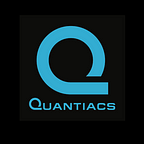Emiliano joined Quantiacs in late 2020 and sent to Quantiacs many suggestions which proved very useful for developing our platform. We had a short chat and we are sharing his thoughts.
Hi Emiliano, can you tell us something about yourself and your background?
I have always had a strong passion for technology and finance. I started following developments of the financial markets on a daily basis since I was 14 or 15 years old, mainly on satellite Bloomberg TV. Later I chose to study Computer Science and got my Masters Degree. In my Master thesis, I used several Machine Learning methods, particularly Genetic Algorithms, to forecast financial markets. In the last ten years — I am 35 now — I had the opportunity to work remotely as a freelancer on various FinTech projects for different clients. A few years ago, I built a trading API from scratch using the FIX protocol for a Dutch hedge fund. I am currently a Professor and I have been teaching Computer Science in several high schools in Italy since 2016.
Why did you step into quantitative trading?
As you can see from my previous answer, my interest in quantitative trading is a result of my passion for Computer Science and Finance. I really enjoy taking part in online competitions, like the Q15 contest Quantiacs is hosting. These competitions have a very appealing common aspect: for a quant like me they are risk-free, as I do not risk my own capital.
Which platform for quantitative trading did you use first?
My first platform, and still overall my most loved one, is — or it is better to say it was — Quantopian, which unfortunately closed down last year. Quantopian offered good educational content, interesting competitions and prizes and introduced me to Jupyter notebooks and Python libraries such as Pandas, Numpy and Matplotlib. I also had great tools for Factor-Based Investing, such as Alphalens and the Pipeline API. When Quantopian shut down, I initially moved to QuantConnect and then beginning in December 2020, to Quantiacs. I hope to win someday a prize in the competition, or even better, more prizes by submitting more than just one strategy.
Why did you join Quantiacs?
I joined Quantiacs mainly because the platform hosts algorithmic trading competitions with large prizes. Moreover, I think there are many improvements going on, as you can see in the new major release which took place in January 2021. Another important factor has been the introduction of the Quantiacs Forum, where I receive support on all my questions almost immediately. On QuantConnect, sometimes I get help and sometimes not, which is not the case with Quantiacs, where I have always received fast and helpful answers. I hope the Quantiacs team will never get bored of my questions!
What is your impression about the new platform we released?
I have a good overall impression. The parameter optimizer, for instance, has never been available on Quantopian and on QuantConnect is available but it is not free. The platform is more stable and writing and organizing strategies is much easier. The community forum is really awesome as I mentioned.
Which methods do you use for developing?
Many times I choose the best bang-for-the-buck approach, which means finding the best freely available strategies and changing the parameters in order to optimize them. But this does not mean that I cannot develop a strategy from scratch, as I normally do for myself and my clients. For instance, I really love building factor based market-neutral strategies. I usually test single alpha factors and then try to combine more alpha factors in the same strategy after z-scoring them and removing extreme outliers. Combining alphas is the funniest part: sometimes you improve the overall Sharpe ratio of the strategy, sometimes not. I believe it is really crucial to choose wisely which factors to combine. The whole process was made really easy on Quantopian by using their Alphalens tool in the Jupyter notebook: I hope Quantiacs will offer something similar.
Which tools should we add to Quantiacs for helping you developing systems?
I think adding more software tools to the platform will be useful, adding some features similar to Alphalens, since it really helped me a lot in developing market-neutral factor based strategies. Another feature would be adding data for other securities in addition to futures, and open a new competition for stock trading. Improving the software stack will be useful, as for me, writing a strategy for Quantiacs seems more complicated than on the two platforms I mentioned. This is probably because it is left to the quant/developer to take care of aspects that could be automated, or streamlined at least. More things could be done automatically by the system. For instance, there’s no possibility of having look-ahead bias on QuantConnect, and there was not on Quantopian, but on Quantiacs you have to take care of it on your own! It could also make the platform more accessible for newcomers.
We will add improvements of course, but from the very beginning we decided to leave to the quants as much space as possible for implementing their ideas without being limited by trading details which can be checked at a later stage. Once the code is submitted it is processed forbidding explicitly looking forward. Coming to data, which datasets would you like to have at your disposal?
Sentiment datasets! I think that there’s a lot of alpha in there! For instance, StockTwits datasets and similar would be awesome. I remember winning my first algo trading competition on Quantopian using a moving average based on the bullishness and bearishness of tweets in that dataset. In general the more the data, the better it is. Having more data is even more important than having more software (as discussed above) because software layers and tools, can be built, but data cannot.
Thank you Emiliano and good luck with the Q15 contest!
